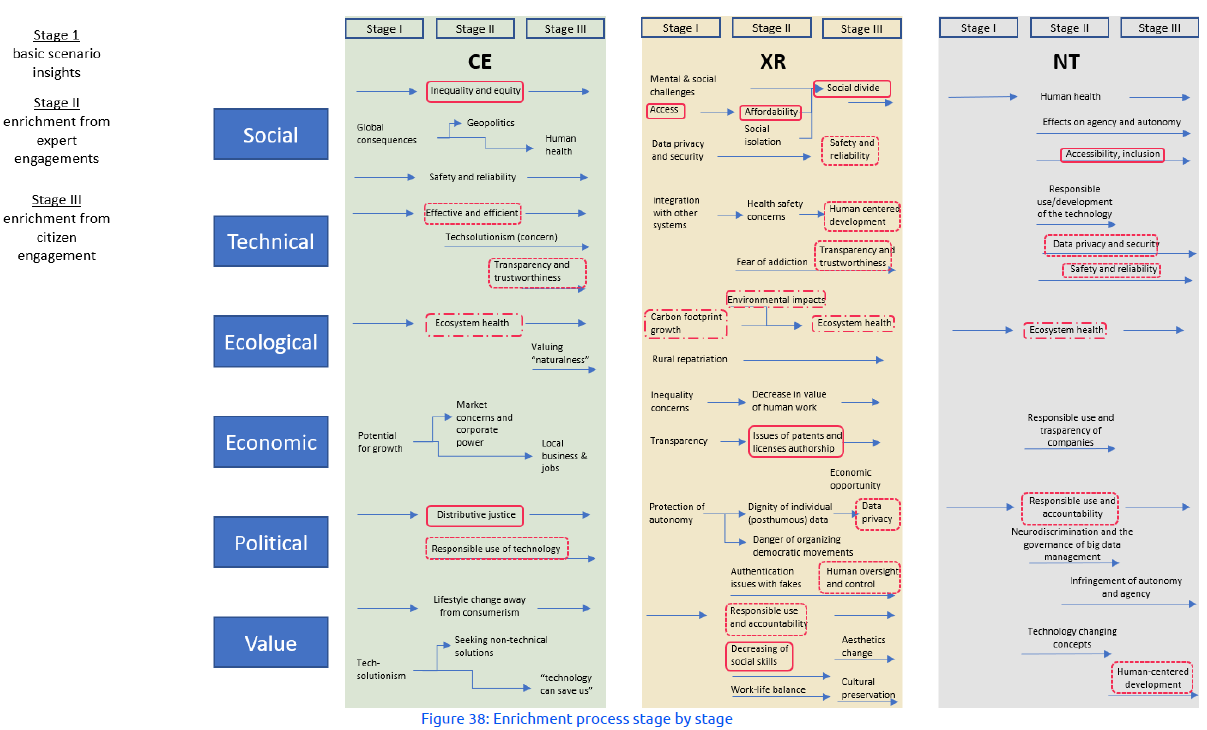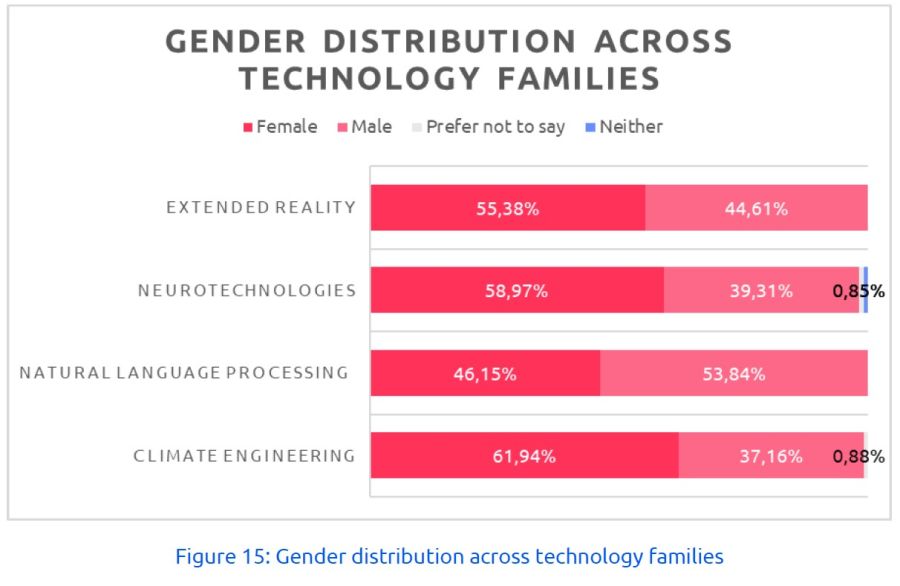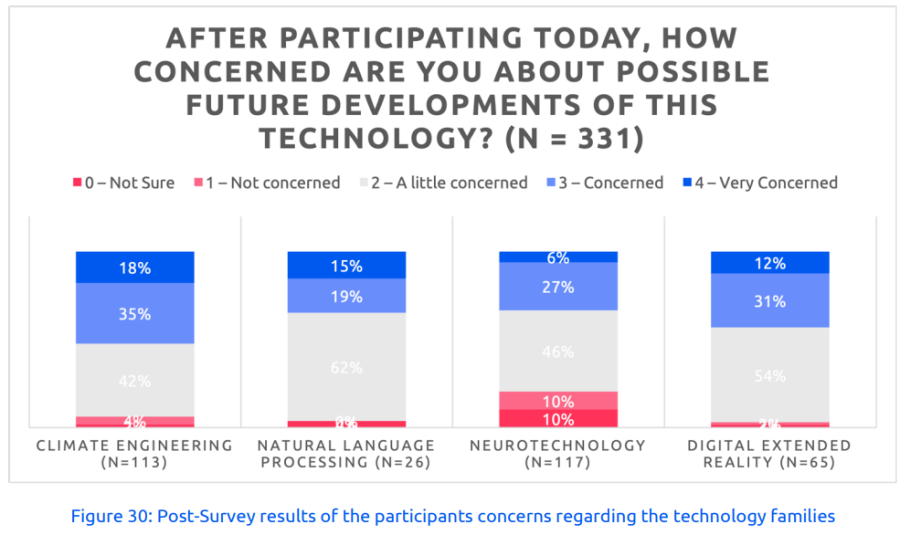Citizen awareness and attitudes towards emerging technologiesTechnologies whose development and application are not completely realised or finished, and whose potential lies in the future. [...]: key takeaways from engagementPublic engagement describes the myriad of ways in which the activity and benefits of higher education and research can be shared with the public [...] workshops
12 September 2023
Authored by: Robyn Sahota (Ecsite)
Reviewed by: Greta Alliaj (Ecsite) and Wenzel Mehnert (AIT)

An important perspective the TechEthos project wanted to highlight alongside expert opinions was the citizen perspective. To encourage participation and facilitate conversation, an interactive game (D3.2) was developed to discuss the ethical issues related to climate engineeringTechEthos defines climate engineering as a technology family which enables the modification of natural processes [...] More (CE), digital extended reality (XR), neurotechnologies (NT), and natural language processing (NLP). The goal of this exercise was to understand citizens awareness and attitudes towards these emerging technologies to provide insight into what the general public finds important.
First Science cafes were held, providing a casual forum for conversation in order to give the public general knowledge and build interest about the three technology families. These science cafes were conducted in: Vienna (Austria), Liberec (Czech Republic), Bucharest (Romania), Belgrade (Serbia), Granada (Spain), and Stockholm (Sweden). These sessions lasted around 90 minutes and consisted of short pitches from invited speaks, Q&A sessions, icebreakers, and open conversation.
Following these science cafes was then the scenario game workshops (D3.1, section 5) held in the aforementioned countries, for a total of 20 events. These workshops engaged a wide audience from varied backgrounds, with an average of 16 participants per workshop with a duration of four hours. These workshops involved an introduction, warm-up, game play, reflection and a post-participation survey. Most participants were motivated to join these workshops due to their curiosity about technology (47.1%), followed by the desire to be involved in how technology develops (16.2%). 40 participants said they took part to the workshop because of their passion for the technology (12.5%). The gender representation in participation was fairly balanced when considering the combined country data per technology familyA technology family is a collection of technologies that share techniques that have common goals [...] workshop.

Awareness
Overall, there was an even distribution of awareness (very aware, somewhat aware, not really aware) among the technology families. 70% of the participants had heard of the technology families discussed, with affective computing being the least known field (48.9% not really aware) and chatbots being the most known field (47.9% very aware), both within the NLP family. The awareness of chatbots can be linked to the prevalence in the general public’s daily life (e.g., Apple’s Siri, Amazon’s Alexa, ChatGPT). In discussions about virtual reality (89% are somewhat or very aware) and brain-computer interfaces (74% are somewhat or very aware), Science-Fiction served as a prominent frame of reference, shaping awareness, perception, and value of these technologies. Looking at the specific technologies in each technology family, we see that the most prominent technologies in CE are nature-based carbon dioxide removal (CDR), in NT brain-computer interfaces, and in NLP and XR it is chatbots and virtual reality.
The least known technologies within the technology families are similar distributed. Every third participant has not heard of solar radiation management (SRM) and Engineered CDR in CE, all three technologies in NT, and affective computing and digital twins in NLP and XR.
Citizens’ attitudes
Nature-based CDR emerged as the most favored technology, being perceived as environmentally friendly and balanced with nature. Conversely, SRM raised significant concerns among participants due to potential unforeseen disasters and pollution.
Neuroimaging generated the most enthusiasm, promising enhanced disease diagnosis and prevention. However, the brain-computer interface elicited worries about manipulation and data protection.
Among NLP technologies, chatbots and text analysis excited participants, offering simplicity and improved work efficiency. On the other hand, affective computing raised concerns about misuse and data privacy.
In the XR family, virtual reality excited participants, providing immersive experiences of distant or historical places. Meanwhile, the metaverse caused apprehension due to potential loss of human connection and data privacy issues.
Acceptance
The results indicate that participants generally accept the presented technologies, as the votes for excitement outweigh the votes for concerns. However, it’s important to note that participants often hold both excitement and concerns simultaneously, making their acceptance more complex.
In the post-survey conducted after game exercises and group deliberations, over 70% of participants expressed excitement or high excitement about possible future developments of the technologies. Simultaneously, approximately 50% of participants conveyed concerns or slight concerns regarding the technologies’ future developments.

Accepting emerging technology is complex as it involves shaping the yet-to-be-created intervention. Participants accept technology if certain conditions (X) are met or issues (Y) are prevented. Their mixed feelings of excitement and concerns reveal the need to understand shared values when discussing acceptance of emerging technologies. Reflecting on citizens’ values helps to comprehend their acceptance and to develop technologies more responsible.
Citizen values
From the workshop comments the citizen value categories (D3.1, Table 24) were extracted through qualitative coding, allowing for comparisons across all workshops.
Each technology family exhibits distinct prominent values. In the NT domain, human health, safety, and responsibility are emphasized due to its focus on the brain and nervous system. NLP and XR prioritize authentic human connection, experience, and responsible use, considering their aim to simulate human interactions.
CE highlights ecosystem health, followed by safety, reliability, effectiveness, efficiency, and justice, given its focus on manipulating natural systems. Safety and reliability are important across all three families. Responsible use and accountability are vital in NT, NLP, and XR. Ecosystem health is a shared concern across all families.
Conclusion
These workshops explored public awareness, attitudes, and citizen values towards emerging technologies. The goal was to elicit citizens’ excitements and concerns to inform ethical guidelinesEthical guidelines collect general or specific principles [...] More, which are then discussed in WP5, and to involve a diverse audience, including vulnerable groupsThose in our societies who face a higher risk of poverty and social exclusion [...], often underrepresented in expert processes. Overall, the “TechEthos game: Ages of Technology Impact” facilitated open and creative discussions.
Common value categories emerged across the technology families through these discussions:
- Safety and reliability: Participants expressed worries about unknown effects, potential dangers, and health impacts in CE, XR, and NT.
- Equity, diversity, and inclusion: Concerns centered on global distributive justice, access for all social groups, and respecting neurodiversity.
- Responsible use and accountability: Participants stressed the importance of accountability for potential disasters, consequences, and data privacy in CE, XR, and NT.
